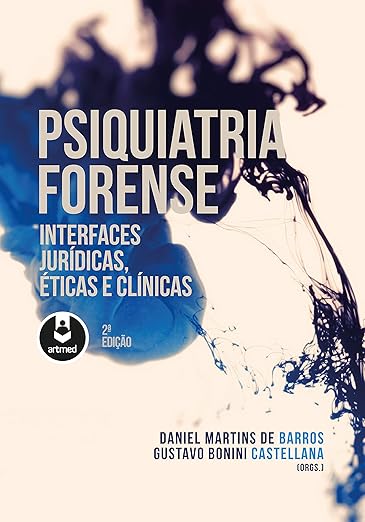Book review: Barros DM, Castellana GB. Forensic psychiatry: legal, ethical, and clinical interfaces. 2nd ed. Porto Alegre: Artmed; 2020
DOI:
https://doi.org/10.25118/2763-9037.2025.v15.1479Keywords:
forensic psychiatry, legal psychiatry, psychiatric jurisprudence, juridical psychiatry, criminologyAbstract
The second edition of the book Forensic Psychiatry: Legal, Ethical and Clinical Interfaces, by Daniel Martins de Barros and Gustavo Bonini Castellana, has established itself as a fundamental work for understanding the complex relationships between mental health, law and medical ethics. It is aimed at professionals in the fields of psychiatry, psychology, law, forensic medicine and others interested in the interfaces between psychiatric knowledge and the justice system. The book assumes a multidisciplinary nature, presenting with clarity and accessible language the dilemmas and responsibilities that arise in clinical and forensic practice.CONTENTS
Part 1 – Legal Interfaces: Relations between Law and Psychiatry
Chapter 1 – Psychiatry and Society
Chapter 2 – Law and Psychiatry
Chapter 3 – Forensic History in Brazil
Chapter 4 – The Psychiatric Evaluation
Chapter 5 – Forensic Neuropsychology
Chapter 6 – Evaluations in Civil Law
Chapter 7 – Evaluations in Criminal Law
Chapter 8 – Evaluations in Labor Law
Chapter 9 – Evaluations in Social Security Law
Chapter 10 – Evaluations in Family Law
Chapter 11 – Evaluations in Childhood and Adolescence
Chapter 12 – Special Evaluations
Part 2 – Ethical Interfaces: Ethical Dilemmas in Mental Health Practice
Chapter 13 – Involuntary Psychiatric Hospitalizations
Chapter 14 – Electroconvulsive Therapy
Chapter 15 – Informed Consent in Psychiatry
Chapter 16 – Psychopharmacology and the Limits of Behavior Manipulation
Chapter 17 – Paternalism and Autonomy in Mental Disorders
Chapter 18 – Free Will and Law
Chapter 19 – Forensic Neuroscience
Chapter 20 – Suicide: Interface between Psychiatry and Law
Chapter 21 – Medical Confidentiality in Psychiatry and Forensic Psychiatry
Chapter 22 – End-of-Life Issues: Psychiatry and Palliative Care
Chapter 23 – Lie Detection and Forensic Psychophysiology
Chapter 24 – Ethical and Legal Dilemmas in Cross-Cultural Practice
Part 3 – Clinical Interfaces: Ethical-Legal Implications of Mental Disorders
Chapter 25 – Legal Aspects in Mood Disorders
Chapter 26 – Psychotic Disorders and Schizophrenia
Chapter 27 – Substance Use Disorders
Chapter 28 – Childhood and Adolescent Disorders
Chapter 29 – Personality Disorders
Chapter 30 – Sexual Disorders
Chapter 31 – Sleep Disorders
Chapter 32 – Forensic Psychiatric Aspects of Epilepsy and Psychogenic Nonepileptic Seizures
Chapter 33 – Impulse Control Disorders
Chapter 34 – Aging and Dementia Disorders
Chapter 35 – Disorders Related to Pregnancy and the Postpartum Period
Chapter 36 – Anxiety Disorders
Chapter 37 – Eating Disorders
Chapter 38 – Tics and Tourette Syndrome
Chapter 39 – Burnout Syndrome
Chapter 40 – Autism Spectrum Disorder
Chapter 41 – Attention-Deficit/Hyperactivity Disorder (TDAH)
Downloads
Metrics
References
Barros DM, Castellana GB. Psiquiatria forense: interfaces jurídicas, éticas e clínicas. 2. ed. Porto Alegre: Artmed; 2020.

Published
How to Cite
Issue
Section
License
Copyright (c) 2025 Jéssica Lovcke, Caio Silveira de Caro, Gabriela de Almeida

This work is licensed under a Creative Commons Attribution-NonCommercial 4.0 International License.
Debates em Psiquiatria allows the author (s) to keep their copyrights unrestricted. Allows the author (s) to retain their publication rights without restriction. Authors should ensure that the article is an original work without fabrication, fraud or plagiarism; does not infringe any copyright or right of ownership of any third party. Authors should also ensure that each one complies with the authorship requirements as recommended by the ICMJE and understand that if the article or part of it is flawed or fraudulent, each author shares responsibility.
Attribution-NonCommercial 4.0 International (CC BY-NC 4.0) - Debates em Psiquiatria is governed by the licencse CC-By-NC
You are free to:
- Share — copy and redistribute the material in any medium or format
- Adapt — remix, transform, and build upon the material
The licensor cannot revoke these freedoms as long as you follow the license terms. Under the following terms:
- Attribution — You must give appropriate credit, provide a link to the license, and indicate if changes were made. You may do so in any reasonable manner, but not in any way that suggests the licensor endorses you or your use.
- NonCommercial — You may not use the material for commercial purposes.
No additional restrictions — You may not apply legal terms or technological measures that legally restrict others from doing anything the license permits.





























